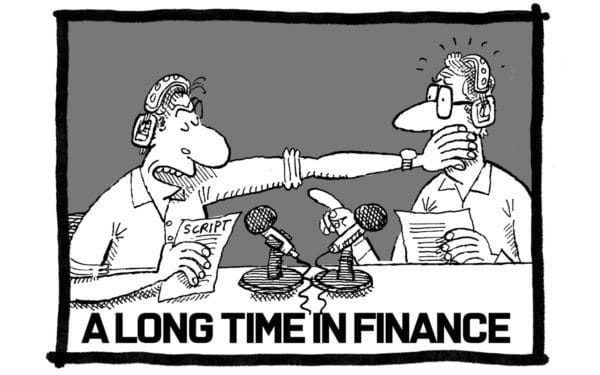Falling house prices, a UK recession and weak financial markets. 2023 doesn’t look a great year for the UK – but the shafts of light are that inflation will be on its way down and the economy should start to recover at some point in the year. Our Top Ten for 2023…
But before that, what did we get right last year? After an extraordinary year, I was amazed to find that our forecasts were quite a lot more accurate than I had expected them to have been. For the second year in a row, we were nearly spot on for UK GDP. We were slightly overoptimistic on world GDP and too low on inflation, even if we warned about it reaching 6% in the UK and 7% in the US.
We were right to warn of sharp rises in interest rates around the world. We warned of possible conflict and mentioned Russia and Ukraine specifically. We accurately warned of a cost-of-living squeeze (though we probably underestimated its extent). The financial crash which we predicted largely happened, especially for bonds and tech stocks, though the Dow and the FTSE finished the year roughly where they started (unlike the S&P which covers a wider range of stocks than the Dow and which fell by roughly 20%). Most European equity indices were down by around 10%.
Our infamous sporting predictions weren’t entirely wrong – we mentioned Argentina as possible World Cup winners and predicted Manchester City for the league and Australia for the Women’s Cricket World Cup. But Lewis Hamilton certainly didn’t win the F1 championship (and it hasn’t proved his swansong either).
We did not predict that the UK would have three prime ministers or the associated political and economic turmoil (though we didn’t say it wouldn’t happen!)
1) For 2023, there is a sense that my law of self-contradicting expectations will apply. If the financial markets believe rates will rise significantly the markets are likely to weaken sharply. But if that happens, rates will not need to rise by so much. So there is a game of chicken being played between the Fed and the markets. The best guess is that it will end in a score draw with a smaller rise in rates than currently proclaimed by central banks but with financial markets down by 10%, which is not a collapse. Property, especially important in the UK, will probably go down a bit more – perhaps by around 15% because prices rose so much during the period when easy money pumped in during the Covid pandemic. This is likely to be driven by the commercial property market, although we expect annual house price contractions to reach at least 8% in the second half of the year.
2) The wave of infections unleashed by the ending of China’s zero-Covid policy will spill over into the West, possibly with new variants. This will create some new supply chain problems, but it does seem that the latest wave is less virulent than its predecessors.
3) The world economy is likely to suffer a growth recession as the aftermath of the end of easy money, especially in the US, hits world growth.
4) The UK will almost certainly face a recession with negative GDP growth for the year, with output contracting by between 1.5% – 2%. This again reflects the unwinding of monetary policy following the belated realisation by the Treasury and the Bank of England that the UK faces a serious inflationary problem
5) Inflation will initially fall quite quickly. But we expect that it will be hard to get it down below around 5% without a sharp rise in unemployment, which does not seem very likely at present in either the UK or the US. So interest rates, which may peak relatively early, may not fall all that fast.
6) Will China invade Taiwan? Our calculations say that 15% of Chinese GDP is in exports to countries that might place sanctions on them if they do so. But such sanctions would be immensely disruptive and would turn Cebr’s world GDP forecast from a growth recession into a real recession with falling GDP, as well as seeing a return to double digit inflation. Chinese bureaucrats are highly skilled and they will be making this point, as well as pointing to the bloody nose Russian invasion forces received in Ukraine. Will the politicians listen? It seems more likely that the Chinese would use more subtle means than outright invasion to pressurise Taiwan.
7) There are relatively few elections in the West scheduled for 2023 but India will hold a series of state elections that will set the tone for the Lok Sabha (Parliamentary) election in 2024. Nigeria, the world’s 7th most populous country, has a general election planned for March. With three strong candidates it is likely that a run-off election will have to be called. Spain has a General Election planned for December after regional elections during the year. The current government hasn’t had much success and the right of centre Partido Popular seems to be ahead in the polls. But its lead has been narrowing. Meanwhile, in Turkey, incumbent president Recep Tayyip Erdoğan may face a challenge from several candidates in June’s presidential election, with the country having endured inflation in excess of 80% during the second half of 2022.
8) On technology, the past year has shown up (as we had predicted) that the rush to green the economy is more expensive than had been assumed. But progress continues. 2023 could be the year of nuclear, as a series of small-scale nuclear power stations are fast tracked in the UK. Vaccine technology – kick started during Covid – seems likely to start showing major results for other diseases. Fusion power seems to be starting to make the technical breakthroughs that will eventually enable it to be commercialised, though its actual use will take many years and it would be wrong to see it as a major contributor to the drive for net zero in the next quarter century. And AI will continue its infiltration into many processes at a pace that will surprise many.
9) The fact that environmental progress is likely to be slower than had been hoped could well increase environmental risks during the year. Although some of the extreme weather conditions during 2022 can be at least partially attributed to causes other than global warming, there is a distinct possibility that the continuing global warming makes extreme weather (including cold snaps) more likely. If this is so, 2023 is likely to show continued risks of climatic volatility following on what was likely the warmest year on record for the UK.
10) And now for the infamous sporting predictions. Our F1 experts have reassessed following the record-breaking season of Max Verstappen and are backing him for a third consecutive world championship title with Red Bull next year. Could 2022/23 see the first Arsenal Premiership title since the early years of Arsene Wenger in 2003/04 – our football experts think so. Will the revitalised England red ball cricket team manage to match the exploits of their white ball colleagues by beating the Australians in the home Ashes series? Our cricket experts expect not, though the white ball side may well hang on to their World Cup. Rugby World Cup is traditionally won by a southern hemisphere side (except of course England in 2003). But the hosts France are the favourites this year and have a tradition of doing well in the competition.
In what is likely to continue to be a troubled year, we hope all our friends and readers can find peace and can achieve their ambitions.
Douglas McWilliams is the founder of Cebr.
Write to us with your comments to be considered for publication at letters@reaction.life




